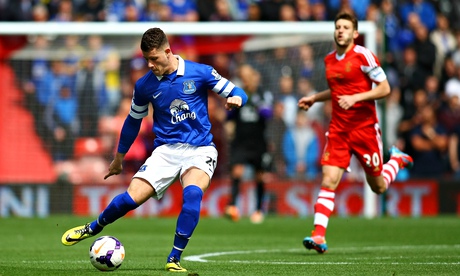
The Premier League has built one of the most exciting sport offerings on the planet. Now, rather foolishly, it’s trying to take on the internet.
The latest battleground is Vine, which is being used to share goalmouth action from grounds across the country.
Social listening tool Sysomos records a measly 19,000 references to all the search connotations of football goals over the past six months. But the reality is there are hundreds of thousands of Vines – often innocuously labeled to avoid legal attention – featuring premiership stars.
The Premier League is not happy. Revenues from broadcast rights are roughly £3bn over three years and it can’t afford to risk that by allowing footage to spread willy-nilly.
Solving this problem, however, is complex. Part of the Premier League’s global appeal is the fact that stadiums are 93% full, creating the passionate atmosphere we expect and thereby making it a much more attractive TV proposition.
The Premier League has made itself unmissable, but then insisted there are times that it must be missed – by refusing to allow all matches to be televised to ensure that fans keep flocking to stadiums across the country.
In a connected world, fans have taken the issue into their own hands, using social media tools such as Vine to open the door to others.
The Premier League has begun serving takedown notices for such intellectual property (IP) breaches. It’s also working on developing technologies such as gif crawlers and Vine crawlers and is working with Twitter on the problem.
But even with Premier League lawyers working flat out, the sport can’t keep up. Even if it could keep track of the new platforms that are continually emerging, the volume of takedown notices it would need to serve to make a dent in the problem would be overwhelming.
Sysomos identifies more than 68,000 mentions of streaming in relation to Premier League football on social media platforms in the past six months, which demonstrates the magnitude of the problem media conglomerates face with cease and desist tactics.
Football IP infringement isn’t new. Ever since the inception of the internet people have used it to share IP-protected content. If there’s a tool on the web, and it can be used to share football content, chances are that it has happened.
Viaccess-Orca, an online piracy monitoring service, estimated that 20 million people illegally viewed football content during the World Cup.
Like the war on drugs, the war on fans is an unwinnable one when conducted on its current terms. People don’t want to steal. But if the Premier League refuses to give fair access to the fans, they will seek other means.
The solution is a more connected view from the Premier League. Football fans need fair access wherever they choose to watch a game. They need access across multiple devices for all games. They need to be able to pay for the content in a micro-payment system similar to the one adopted by iTunes.
You can’t fight the internet or the modern day consumer. The future model of football consumption can be seen in today’s fan behaviour.
It is just that the Premier League, like so many other businesses with archaic business models before it, refuses to accept the inevitable. It needs to stop fighting and embrace this behaviour. For its own sake, it needs to improve it and monetise it before someone else does.
Pete Wood is the head of social media at 360i London.
More like this
• Great British Bake Off: when iced buns meet intellectual property
• The importance of net neutrality for the connected car
• Regulators must lighten up as they clash with the sharing economy
To get weekly news analysis, job alerts and event notifications direct to your inbox, sign up free for Media Network membership.
All Guardian Media Network content is editorially independent except for pieces labelled ‘Advertisement feature’. Find out more here.

